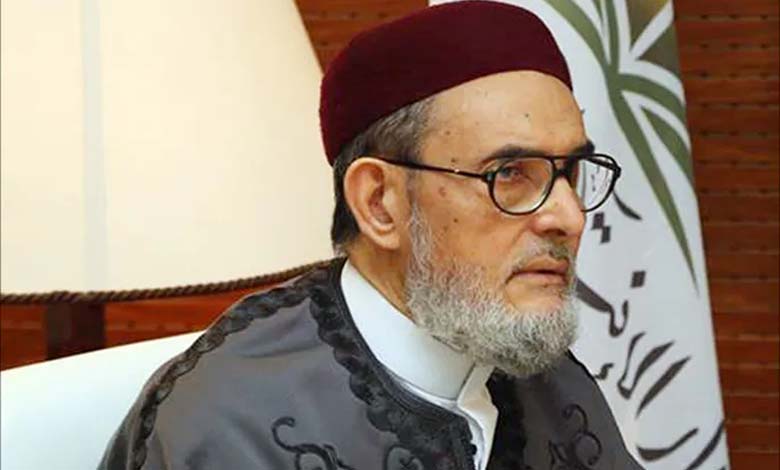The “Terror Godfather” in Libya: al-Gharyani’s Fatwas Target Russia

Sadiq al-Gharyani, the voice of terrorism in Libya, continues to issue incendiary fatwas from time to time, aimed at undermining peace support efforts by all means.
Al-Ghariani, who tops both local and international terrorism lists, hasn’t settled with supporting extremists with aberrant fatwas but has exploited religion as a means to achieve his nefarious goals, serving the policies of certain countries that do not desire stability in Libya. He also works to serve the goals and agendas of terrorist groups, using them as a pretext to commit terrorism in Libya. Al-Ghariani has become synonymous with the causes of fragmentation, division, and chaos in the country.
What Did He Say?
A few days ago, Al-Ghariani issued a fatwa sanctioning war against Russian forces in the eastern and southern regions of the country, represented by the African Corps, which he described as an “aggressive invader,” claiming that this is “a religious duty for the people of Libya.”
Al-Ghariani, who has close relations with the outgoing Prime Minister of the Government of National Unity, Abdul Hamid Dbeibeh, called for the expulsion of Russian forces “by all means.”
According to Libyan experts and analysts, al-Gharyani’s fatwa comes in the context of the power struggle between the major powers, with the Muslim Brotherhood and Islamist currents in Libya aligning with Western powers against Russia, seen as an ally of General Khalifa Haftar, the Commander-in-Chief of the Libyan National Army, in his decade-long battle against armed groups and militias affiliated with the Muslim Brotherhood.
Al-Ghariani wanted to send a message of disapproval regarding the recent visit to Moscow by a delegation from Tripoli, including Presidential Council member Abdullah Al-Lafi, Chief of Staff of the Western Region Forces Mohammed Al-Haddad, and Acting Foreign Minister Taher Baour.
Testing Reactions
For his part, Libyan journalist and political analyst Ayoub Al-Awajali said that al-Gharyani’s latest fatwa suggests a significant divide in the western part of the country between Islamist groups and the Muslim Brotherhood regarding their stance towards Russia.
Al-Awajali added that this event illustrates the divergences that occurred after a delegation from the Presidential Council and the Chief of Staff of the Western Region met with Russian Foreign Minister Sergey Lavrov in Moscow, and the prior visit of a Russian delegation to the west.
He suggested that this indicates an impending conflict between militias loyal to Al-Ghariani and those based in Tripoli.
Al-Awajali emphasized that al-Gharyani’s fatwa is akin to “throwing a stone into stagnant water” to identify parties aligned with Russia and those opposing it, thus facilitating decision-making and gauging reactions.
He argued that the Russian presence in Libya is part of the conflict between the two superpowers, the United States and Russia, noting that this conflict has surfaced across North Africa and the entire Sahel region.
Deepening the Gap Between Parties
For his part, Libyan researcher and political analyst Ahmed Abu Arqoub said that Al-Ghariani has long ceased to be merely a mufti, becoming largely a political figure.
Abu Arqoub said “Al-Ghariani consistently focuses on a political discourse wrapped in religious rhetoric to demonize Marshal Haftar and anyone allied with him. So, it is not surprising that Al-Ghariani calls for targeting Russian forces, seen as allies of Marshal Haftar.”
He argued that the best way to expel foreign forces from Libya is to accelerate the achievement of a political settlement ensuring the unification of political and military institutions and providing sufficient guarantees for holding elections, leading to the formation of an elected government on solid ground, capable of working to expel all mercenaries and foreign forces from Libyan territory.
The Mufti of Blood
This isn’t the first fatwa from Al-Ghariani calling for combat in Libya. He has previously issued calls to armed militias in Libya to take to the streets to prevent elections by force.
Al-Ghariani has also incited violence against officials in the eastern region of Libya, including Marshal Haftar and parliament deputies, calling for them to be barred from participating in elections.
Sadiq al-Gharyani, the former mufti of Libya, was ousted by the Libyan Parliament on November 9, 2014, due to his fatwas that fueled bloody conflicts among Libyans for years.
However, he still heads the Dar al-Ifta, exploiting radical Islamist militias that protect him and give him power in exchange for religious legitimacy.
Al-Ghariani is known in Libya as the “Mufti of Ruin” and the “Mufti of Terrorism” due to his support for terrorist groups in Libya, for which he issued fatwas authorizing the killing of Libyan soldiers.
Despite not being a member of the Muslim Brotherhood organization, Al-Ghariani is considered the mastermind of the organization in Libya and its most prominent reference.
Al-Gharyani’s positions, which have consistently fueled war and conflict through his extremist fatwas, have become a compass for the terrorist Muslim Brotherhood organization, especially as he is the primary driver of the military wing of the group represented by radical militias spread throughout the western part of the country.
Since 2012, Al-Ghariani has played a role akin to a “religious arm” for extremist groups in Libya, issuing fatwas that align with their interests, goals, and agendas. These fatwas have led to several acts of violence, making him one of the main contributors to the spread of chaos and division in Libya.












